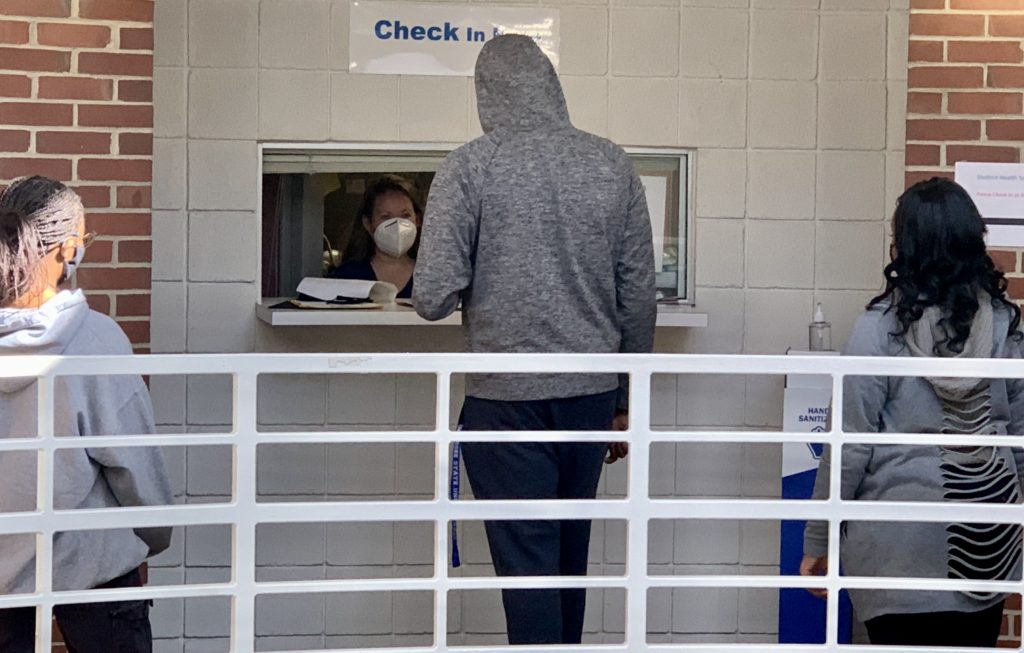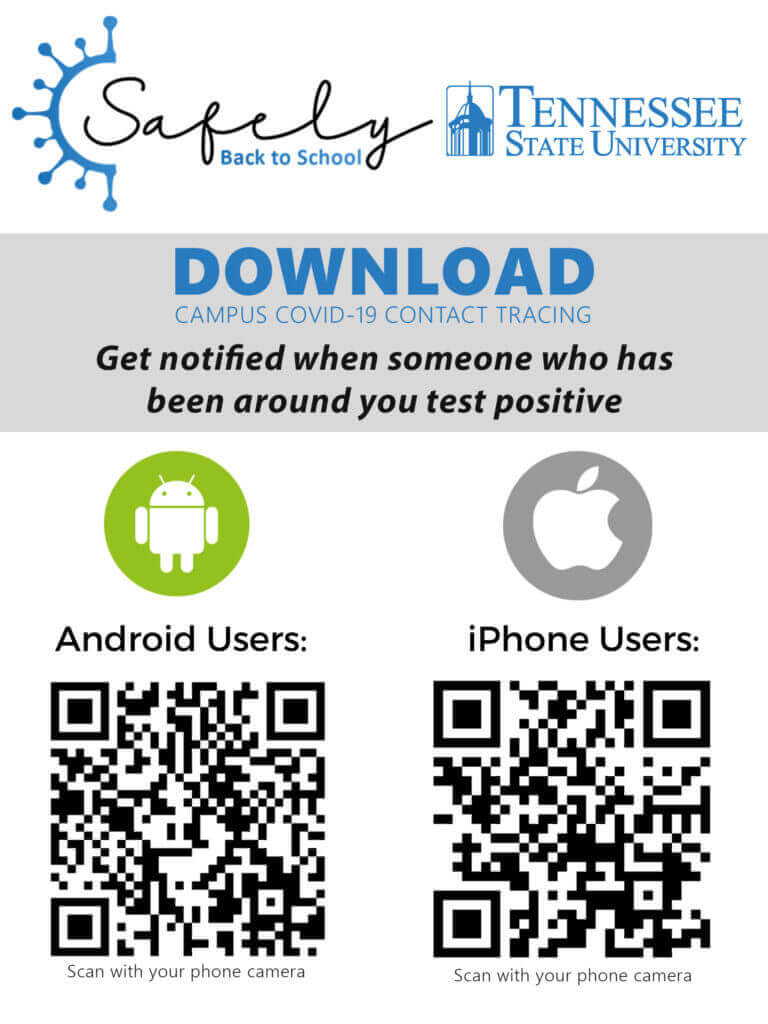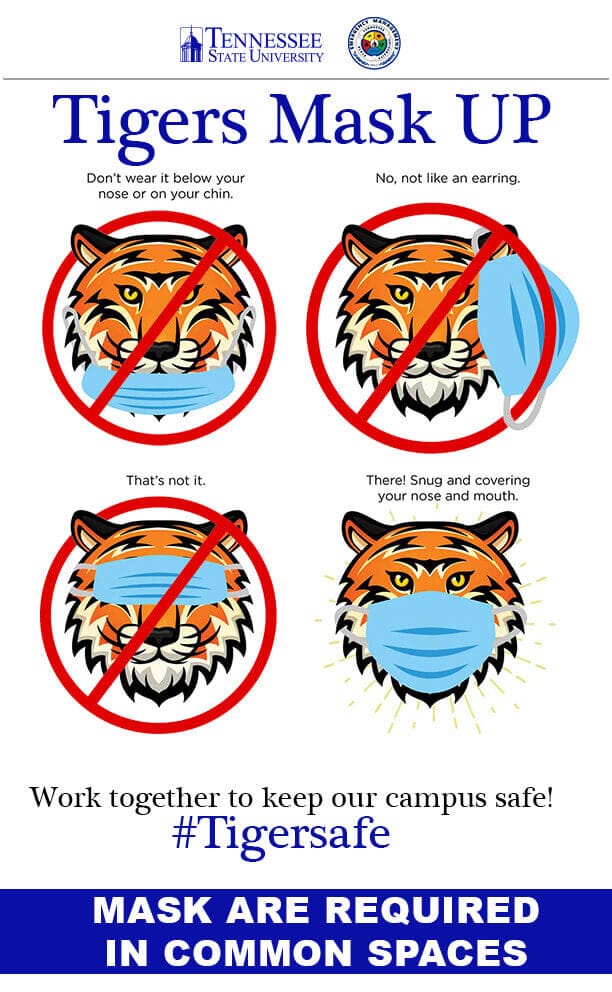NASHVILLE, Tenn. (TSU News Service) – College campuses across the country are using creative ways to battle the latest surge of the coronavirus. At Tennessee State University – with one of the lowest number of cases among Tennessee colleges – officials are using technology and offering incentives to students to help curb the spread of the virus among the campus population.

The university has stepped up its rapid testing, encourages students to do more contact tracing using a new software, and has set up electronic temperature checks around campus. Tigers Mask Up, an initiative that offers students discount cash coupons for observing proper protocols, has also been introduced. Additionally, the university encourages free discussion of the virus among students and staff.
“It is not a taboo to talk about cases and persons who are experiencing symptoms. The open discussion helps,” says Dr. Curtis Johnson, chief of staff and head of the TSU Coronavirus Pandemic task force.
He says the Tigers Mask Up initiative, introduced by the task force, is intended to recognize the efforts of students who go the “extra mile” to ensure compliance.

“The task force monitors what’s going on and makes recommendations to modify activities when necessary or initiate efforts to move us ahead, and so far, our efforts are paying off,” Johnson says.
A New York Times survey of more than 1,700 colleges and universities shows more than 214,000 cases and 75 deaths (mostly college employees) since the pandemic began, with Tennessee colleges accounting for 6,540 of those cases. Since TSU reopened for the fall with hybrid learning, the university has reported less than 75 cases, with mostly mild to no symptoms and no hospitalization.
Johnson and others attribute TSU’s low number to the university’s vigilance with testing and students’ overall cooperation with protocols put in place to keep them safe. The TSU Student Health Center is averaging between 50-100 students who come in per day to be tested.

Dana Humphrey, head nurse of the Student Health Center, says testing is going very well and students are very open to coming in to get tested.
“The kids are really engaged and trying to come and get tested,” she says. “They are proactive and really anxious about follow-ups and making sure they are healthy.”
Frequent testing is widely encouraged among the student population. In fact, the Aristocrat of Bands, and all sports program on campus have made testing mandatory for their members. Band members are required to test once a week if they live on campus, and twice a week if they live off campus. Members of all sports programs are required to test once a week.
Kristian Davis, a freshman biology major from Birmingham, Alabama; and Terriana Holt, a senior human performance sports science major, have tested a combined 15 times. Davis was positive on her first test and went into mandatory quarantine. She says she came into contact with someone who was positive. Davis has since been cleared.
“I have been tested six times,” she says. “I tested positive and went into isolation for two weeks. The staff was really nice, making sure I had everything I needed. I am glad TSU is making sure we are safe.”
For Holt, a member of the AOB, where she plays the trumpet, the experience with frequent testing “is no sweat,” she says.
“I really don’t mind because it is for my health and for the health of my fellow band members and the health of the school in general,” says Holt, who has tested nine times. “I see it as just a precaution.”
Frank Stevenson, associate vice president of student affairs and dean of students, says students who test positive for COVID-19 are placed in an area identified as IQ, or isolation and quarantine zone where they receive “round the clock” service, including a health professional, meal service delivered three times a day, laundry service, and medication if needed.
“We have had great success managing students who have tested positive in providing a safe and comfortable space for them to be in while they go through their time period mandated by the CDC,” says Stevenson. “We’ve had a couple of students who were taken to the hospital for checkup, but none have been admitted or hospitalized. For the most part, 95 percent of the students that we’ve encountered have had very mild to no symptoms.”
Dr. William Hytche, assistant dean of students, manages activities in the IQ zone. He says students with positive cases are put in quarantine, while those who have been exposed or have been around someone who is positive, are put in isolation. Those in isolation are given a resting period to see if they develop the virus. In either case, a student stays in the IQ zone for a minimum of 10 days. To be released, Hytche says a student must be tested and produce two negative results over two days.
“Students in the IQ zone have access to medical staff and must give a daily report of how they feel,” says Hytche. In addition to help with the student’s physical health, mental health services are also available.
“If a student feels like, “The walls are closing in on me’, we get the university counselors involved who contact the student and evaluate their situation,” ‘Hytche says.
For updates or information on TSU’s COVID-19 protocols, go to https:/www.tnstate.edu/return/
Department of Media Relations
Tennessee State University
3500 John Merritt Boulevard
Nashville, Tennessee 37209
615.963.5331
About Tennessee State UniversityFounded in 1912, Tennessee State University is Nashville’s only public university, and is a premier, historically black university and land-grant institution offering 39 bachelor’s degree programs, 24 master’s degree programs, and seven doctoral degrees. TSU is a comprehensive research intensive institution with a R-2 Carnegie designation, and has a graduate school on its downtown Avon Williams Campus, along with the Otis Floyd Nursery Research Center in McMinnville, Tennessee. With a commitment to excellence, Tennessee State University provides students with a quality education in a nurturing and innovative environment that prepares them as alumni to be global leaders in every facet of society. Visit the University online at tnstate.edu.

